Covid-19 world: Taiwanese Covid guru Chen Chien-jen says the virus will be over in July for vaccinated nations
Highly vaccinated countries, including Australia, will no longer need to fear Covid-19 according to an expert, as most restrictions are scrapped in England.
Coronavirus
Don't miss out on the headlines from Coronavirus. Followed categories will be added to My News.
Taiwan’s former vice-president Chen Chien-jen has boldy claimed that within six months millions of fully jabbed people will no longer need to worry about Covid-19.
The Johns Hopkins-trained epidemiologist told The Australian that by “June or July” people in highly vaccinated places including Australia, Taiwan, Japan, Europe and North America will be ready “for turning down our worry about Covid-19”.
“Covid is not the Covid of before. We already have good defences,” Professor Chen said from in his office at Taipei’s Academia Sinica, Taiwan’s peak research centre.
Chen was dubbed Taiwan’s “SARS hero” in 2003 when he was health minister after he thwarted the lethal virus first detected in China’s south.
In 2020, Chen – then in his final months as vice-president – was lauded as Taiwan’s “weapon against coronavirus” as he co-ordinated the world’s best response to the new foe from Wuhan.
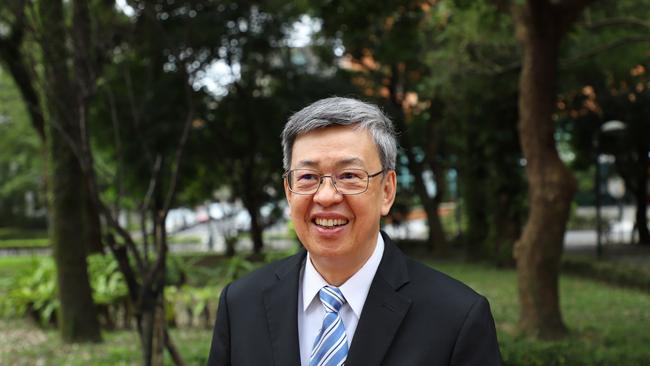
And now he has advised his former boss, President Tsai Ing-wen, that Taiwan’s high vaccination levels – just below Australia’s – means it can relax many Covid restrictions he helped put in place.
“After this Chinese New Year festival, maybe we will loosen,” he said.
On Wednesday, Australia reported more than 50,000 domestic cases, while Taiwan only had recorded 46.
However, Chen, a big fan of Oxford University’s Our World in Data website, said he still has a lot of confidence in Australia.
“The reason for that is your vaccination rate is high,” he said.
Most of Australia’s recent cases have been of the less deadly, more infectious Omicron strand.
Australia’s current situation is increasingly like the health scenario Chen predicted in February 2020 with Covid-19 becoming like the flu: highly infectious but rarely lethal.
“For those who receive the two doses of the immunisation … most of them are asymptomatic, or have minor symptoms … sore throat, sneezing and coughing, and so forth,” he said.
Taiwan, along with Australia and New Zealand, is in a group where the mortality rate has decreased during the pandemic.
Now public health experts and governments around the world are trying to learn from Taiwan’s extraordinary success.
“It gives me optimism,” Chen said. “The entire world can be changed, as long as we have the will to change it.”
ENGLAND LIFTS VIRUS RESTRICTIONS AS OMICRON THREAT FADES
Commuters trooped back to the office in England on Thursday local time, with public transport visibly busier, after the government scrapped restrictions imposed to combat the Omicron coronavirus variant.
The return to “Plan A” measures — ditching legal requirements for face coverings and shelving vaccine passports — comes as the number of positive Covid-19 cases has fallen sharply from record levels.
Infection rates have plateaued in recent days and are still high — more than 100,000 confirmed cases were recorded on Wednesday — but the National Health Service is no longer facing imminent crisis.
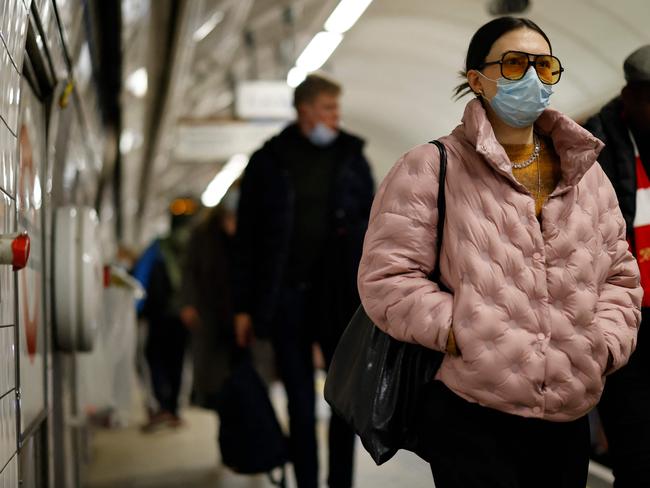
British Prime Minister Boris Johnson said restrictions could be lifted due to “the success of our booster rollout, the tireless work of the NHS and the amazing public response”.
But he urged more people to get vaccinated and warned: “The pandemic is not over. Everyone should remain cautious.”
Mr Johnson, who spent several days in intensive care with Covid in 2020, introduced the so-called “Plan B” restrictions on December 8, after warning of a looming “tidal wave” of Omicron.
Face masks were required in all enclosed spaces and people were told to work remotely. Vaccine documentation to enter places such as nightclubs, football grounds and large-scale events was also controversially required.
England had lifted restrictions on July 19 last year but then reintroduced them as the Omicron wave hit.
Limits on visitors to care homes in England will also be scrapped from next week, with residents able to have unlimited visits from family and friends.
Businesses will still be able to impose restrictions but they will no longer be a legal requirement.
On public transport in London, for example, face coverings are still mandatory. But secondary school students will no longer have to wear masks.
US tourist Ethan Letson, 24, agreed with London Mayor Sadiq Khan’s decision to keep face coverings as a condition of travel.
“I still wear the mask on public transport. I will wear it in very crowded areas like the Underground. It’s so tight down there, you could get sick at any time,” he said.
Unlike Scotland and Wales, which set their own health policy, England kept nightclubs and bars open over the festive period.
But businesses still took a heavy hit as punters stayed at home. Hospitality workers in the business district around St Paul’s said things had only just started to improve.
“The last week, business has started to pick up again. Around Christmas it was dead,” said bartender Lewis Colby, 39.
“People aren’t so scared anymore, trains are busier coming into work, people are starting to drink more.”
Despite the lifting of restrictions, those who test positive for coronavirus must still self-isolate for a minimum of five days.
Mr Johnson said he also hopes to scrap those rules when they expire on March 24.
ENGLAND’S NEW CASES ‘REPEAT INFECTIONS’
Nearly two-thirds of people in England who tested positive for Covid-19 in January previously had the virus or suspected they had it, according to a large long-running infection survey released on Wednesday.
The finding, in the latest report on coronavirus transmission by Imperial College London, is seen as further evidence of the Omicron variant’s ability to dodge the immune systems of those previously infected with the virus.
As part of its regular assessment, Imperial received around 100,000 valid swap tests self-administered by a random sample of people across England between January 5 and 20.
Approximately 4,000 showed a positive result, and nearly 3,600 of those individuals specified whether or not they had had Covid before.
Around 65 per cent of those respondents had previously tested positive, while a further 7.5 per cent said they suspected they had caught the virus previously but had not received a confirmatory test.
“Past infection was associated with high risk of reinfection with Omicron,” the study’s authors noted in its abstract.
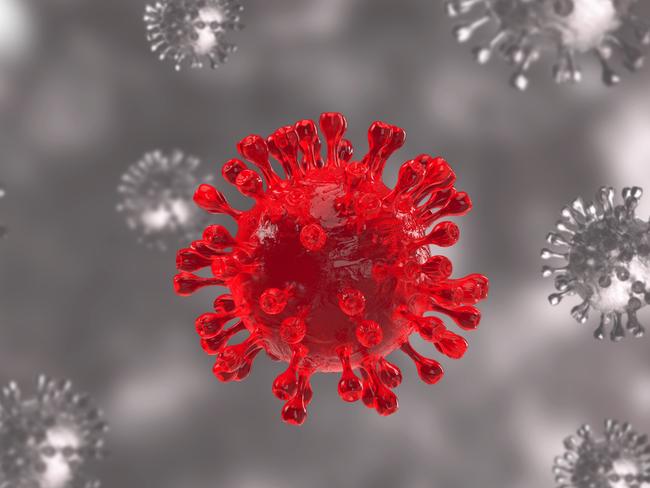
However Paul Elliott, who directs the Imperial study, noted not all these cases could be confirmed as reinfections because some could be residual illness, meaning a person had tested positive twice for the same infection.
But the numbers reporting reinfections in the study are markedly higher than those published by the UK Health Security Agency, a public health protection body.
Its latest figures show 11 per cent of all English cases were reinfections. The UKHSA said Wednesday it would begin including reinfections data on the government’s rolling coronavirus data dashboard from the end of the month.
A reinfection is defined as a person testing positive twice at least 90 days apart.
The Imperial survey also confirmed Omicron, which has swept the UK since late November, is now responsible for nearly all new infections in England.
Positive cases among its randomly selected sample were three times higher in the January sampling period than the previous month, it found.
“We observed unprecedented levels of infection with SARS-CoV-2 in England in January 2022 and almost complete replacement of Delta by Omicron,” the report said.
However, the study detected that the prevalence of the virus among adults was starting to decline.
England on Thursday will lift the last of various virus curbs reimposed last month as Omicron surged nationwide, including the requirement to wear masks in most settings.
A so-called Covid pass system for nightclubs will also be scrapped, as the country returns to its lowest level of restrictions of any stage of the pandemic
SUPERSTAR TESTS POSITIVE FOR COVID
Sir Elton John has tested positive for Covid.
The Rocket Man singer, 74, has been forced to cancel two shows in Dallas, Texas, it was announced.
“It is with great regret that the Farewell Yellow Brick Road tour dates in Dallas set for Tuesday, January 25 and Wednesday, January 26 must be postponed due to Elton recently testing positive for Covid-19,” a statement confirmed.
“Fortunately, Elton is fully vaccinated and boosted, and is experiencing only mild symptoms. Fans should hold on to their tickets as they will be honoured at the rescheduled dates to be announced soon.”
“Elton and the Farewell Yellow Brick Road tour look forward to returning to the stage shortly.”

OMICRON VACCINE TRIALS BEGIN
Pfizer and BioNTech have started a clinical trial to test the safety and immune response of their Omicron-specific Covid-19 vaccine in adults aged up to 55, the companies said in a statement Tuesday.
Pfizer’s chief executive Albert Bourla previously said that the pharmaceutical giant could be ready to file for regulatory approval of the shot by March.
The company’s head of vaccine research Kathrin Jansen said in a statement that while current data showed that boosters against the original Covid strain continued to protect against severe outcomes with Omicron, the company was acting out of caution.
“We recognise the need to be prepared in the event this protection wanes over time and to potentially help address Omicron and new variants in the future,” she said.
Ugur Sahin, CEO of the German biotech company BioNTech added that the protection of the original vaccine against mild and moderate Covid appeared to wane more rapidly against Omicron.
“This study is part of our science-based approach to develop a variant-based vaccine that achieves a similar level of protection against Omicron as it did with earlier variants but longer duration of protection.” The trial will involve 1,420 people aged 18-55.
A spokesman for Pfizer said that it did not include people older than 55 because the goal of the study was to examine the immune response of participants dosed, rather than estimate vaccine efficacy.
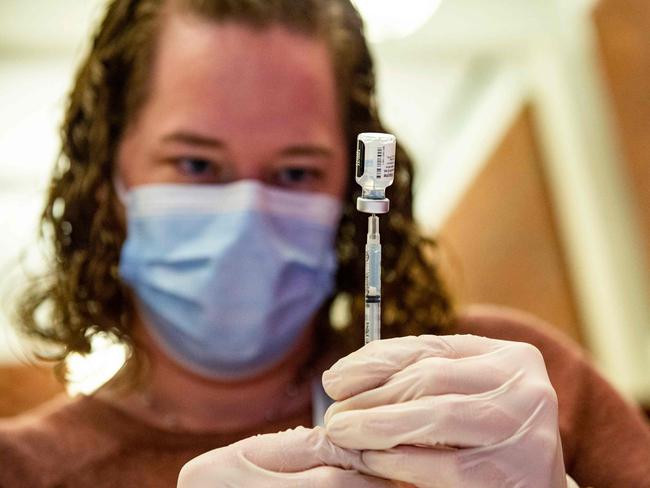
The trial is taking place across the United States and South Africa, and the first participant was dosed in North Carolina.
The volunteers are split into three groups.
The first involves people who previously received two doses of the current Pfizer-BioNTech vaccine 90-180 days prior to enrolment, and will receive one or two doses of the Omicron vaccine.
The second will be people who got three doses of the current vaccine 90-180 days prior to the study and will receive either another dose of the original shot or an Omicron-specific vaccine.
The third and final group are people who have never previously received a Covid vaccine, and will receive three doses of the Omicron-specific vaccine.
The Pfizer-BioNTech vaccine was the first Covid shot to be authorised in the West, in December 2020.
Because it is based on messenger RNA technology, it is relatively easy to update to reflect the genetic code of new variants.
Several countries have begun to emerge from their latest waves driven by Omicron, the most transmissible strain to date, even though global new cases are still rising.
The coronavirus has killed some 5.6 million people since the outbreak emerged in China in December 2019.
BORIS JOHNSON’S NEW PARTY DRAMA
Boris Johnson has come under pressure to resign over a series of parties that happened at Downing Street while the rest of the country was under strict Covid-19 restrictions.
The latest scandal involves his wife Carrie organising a surprise birthday party for him during the country’s first lockdown, despite the rules forbidding social gatherings indoors, according to ITV.
Downing Street confirmed that the British prime minister attended the gathering in the cabinet room at No 10 with up to 30 people at 2pm on 19 June 2020, but denied reports he held a birthday party later in the Downing Street residence.
ITV News also reported that the interior designer Lulu Lytle, who was not a member of No 10 staff, attended the gathering.
Lytle was the designer tasked with renovating Johnson’s flat in Downing Street, which became the subject of significant controversy after a donor was asked to fund the refurbishment.
It’s believed staffers brought the prime minister a birthday cake and picnic food from M&S, and the gathering lasted 20-30 minutes, according to ITV.
No 10 said Johnson attended the event for less than 10 minutes.
However it’s alleged Johnson then hosted family and friends later that afternoon in his home, although No 10 has denied this, claiming he hosted only a small number of family members outside.
“A group of staff working in No 10 that day gathered briefly in the cabinet room, after a meeting, to wish the prime minister a happy birthday. He was there for less than 10 minutes, a No 10 spokesman said.”
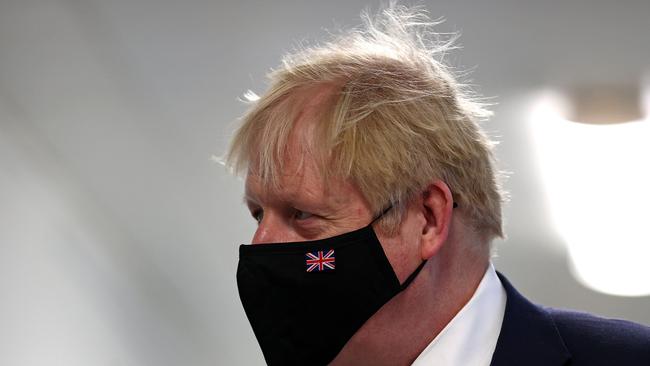
Regarding the later party in the flat, a spokesman said: “This is totally untrue. In line with the rules at the time, the prime minister hosted a small number of family members outside that evening.”
Social gatherings indoors at the time were banned, with people permitted only to meet outside in groups of up to six.
It’s not the first time Johnson has been caught having parties during the pandemic.
At the end of November last year, the Daily Mirror newspaper first reported that a series of Christmas parties had occurred at Number 10 Downing Street — some of which Johnson attended — during the second wave of the Covid-19 pandemic, in November and December 2020, when indoor mixing was banned in London.
ERIC CLAPTON’S BIZARRE VAX CLAIM
Eric Clapton’s claims people who have been vaccinated against Covid-19 are “under hypnosis” as he swaps his musical career to campaign against conventional medicine.
The 76-year-old musician went on the Real Music Observer YouTube channel to discuss how his life has changed since reluctantly taking AstraZeneca’s therapy in 2021.
He has since become outspoken about his anti-vaccination stance.
Clapton claimed that he’d been duped into getting the Covid-19 jab by subliminal messaging in pharmaceutical advertising — and urged others not to fall for it.
“Whatever the memo was, it hadn’t reached me,” he said, referring to the “mass formation hypnosis” conspiracy theory, which gained traction in 2021 as part of anti-vaccine propaganda.

“Then I started to realise there was really a memo, and a guy, Mattias Desmet [professor of clinical psychology at Ghent University in Belgium], talked about it,” Clapton continued.
“And it’s great. The theory of mass formation hypnosis. And I could see it then. Once I kind of started to look for it, I saw it everywhere.”
The former Cream guitarist also admitted he had given up on news media, describing it as “one-way traffic about following orders and obedience” — a decision that he said has helped him creatively and professionally.
The Rock and Roll Hall of Famer — who has four daughters, Ruth, 37, Julie, 20, Ella, 19, and Sophie, 16 -also joked about losing touch with friends and family over his political view.
“My family and friends think I am a crackpot anyway,” he said.
“Over the last year, there’s been a lot of disappearing — a lot of dust around, with people moving away quite quickly.
“It has, for me, refined the kind of friendship I have. And it’s dwindled down to the people that I obviously really need and love,”.
WHO CALLS FOR MORE RESTRICTIONS
After worldwide protests broke out against vaccine mandates and pandemic-era laws, the World Health Organisation said the Covid emergency could only end this year through more vaccines and more restrictions.
Hundreds of thousands of demonstrators took to the streets in the United States, Australia, Sweden, France, and Belgium to demonstrate the “tyranny” of forced vaccine injections.
Despite the weekend of turmoil, the head of the World Health Organisation said the planet can’t end the Covid-19 emergency this year without more vaccines.
“We can end Covid-19 as a global health emergency and we can do it this year,” Tedros Adhanom Ghebreyesus told the UN health agency’s executive board on Monday local time.
While countries like Australia, the UK and the US remove restrictions after two-years of lockdowns, the WHO head warned countries must be kept restrictions in place and work harder at providing access to vaccines.
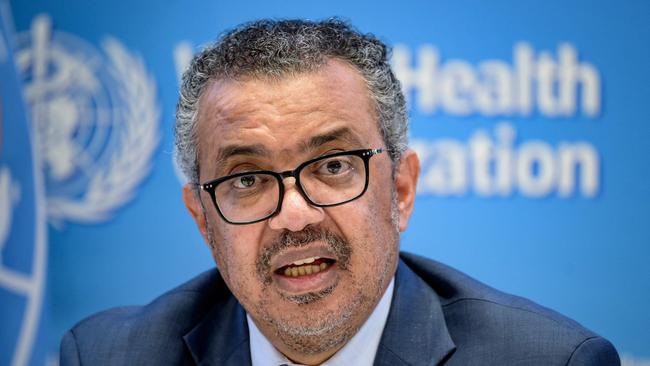
The WHO has for months demanded that countries do more to accelerate the distribution of vaccines in poorer nations, calling on all countries to vaccinate at least 70 per cent of their populations by the middle of this year.
Half of the WHO’s 194 member states missed the previous target of vaccinating 40 per cent of their people by end-2021 and 85 per cent of people in Africa were yet to receive a single jab, Tedros said.
“We simply cannot end the emergency phase of the pandemic unless we bridge this gap,” he said.
The WHO chief said the world would need to learn to live with Covid. “We will need to learn to manage it through a sustained and integrated strategy for acute respiratory diseases,” he said, emphasising it was “dangerous to assume that Omicron will be the last variant, or that this is the end game.”
“On the contrary,” he said, “globally the conditions are ideal for more variants to emerge.” “The potential for a more transmissible, more deadly variant remains very real.”
His comments come after mass protests broke out across the globe.
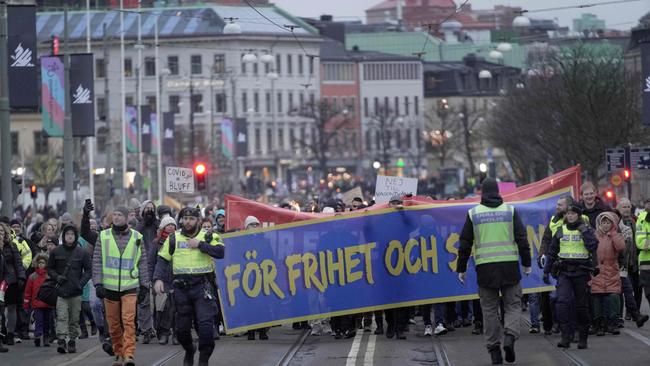
About 35,000 people attended the “Defeat the Mandates” march at Washington DC’s Lincoln Memorial. Robert F. Kennedy, Jr led the calls for an end to vaccine passports and a reasonable debate about consent.
In Belgium, police fired water cannons and tear gas at a group of 50,000 protesters marching through Brussels against Covid laws.
Protesters in London threw National Health Service uniforms at police during the World Wide Rally for Freedom.
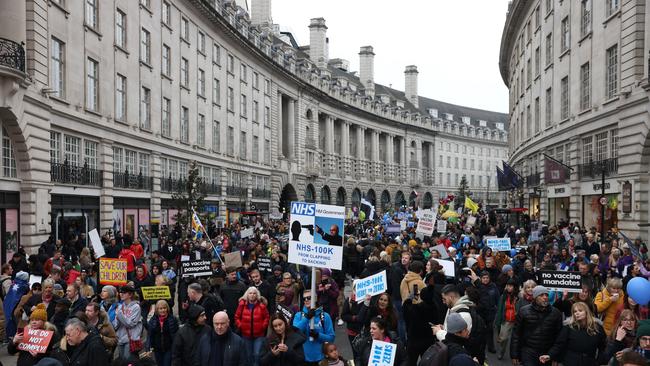
Thousands of protesters demonstrate in Sweden’s two biggest cities against the use of vaccine passes, in marches that passed off peacefully despite concern about clashes between neo-Nazi groups and their opponents.
Around 38,000 people marched across France, according to government figures, two days before everyone aged 16 and above had to start showing proof of vaccination to access restaurants, bars and transport.
French government deputy Romain Grau was punched by a protester after demonstrators in the southern city of Perpignan after he went to talk to a group of them at his constituency office.
EUROPE HEADED FOR PANDEMIC ‘ENDGAME’
The Omicron variant has moved the Covid-19 pandemic into a new phase and could bring it to an end in Europe, the WHO Europe director says.
“It’s plausible that the region is moving towards a kind of pandemic endgame,” Hans Kluge told AFP in an interview, adding that Omicron could infect 60 per cent of Europeans by March.
Once the current surge of Omicron currently sweeping across Europe subsides, “there will be for quite some weeks and months a global immunity, either thanks to the vaccine or because people have immunity due to the infection, and also lowering seasonality”.
“We anticipate that there will be a period of quiet before Covid-19 may come back towards the end of the year, but not necessarily the pandemic coming back,” Kluge said.
Top US scientist Anthony Fauci expressed similar optimism on Sunday.
He told ABC News talk show “This Week” that with Covid-19 cases coming down “rather sharply” in parts of the United States, “things are looking good”.
While cautioning against over confidence, he said that if the recent fall in case numbers in areas like the US’s northeast continues.
“I believe that you will start to see a turnaround throughout the entire country”.
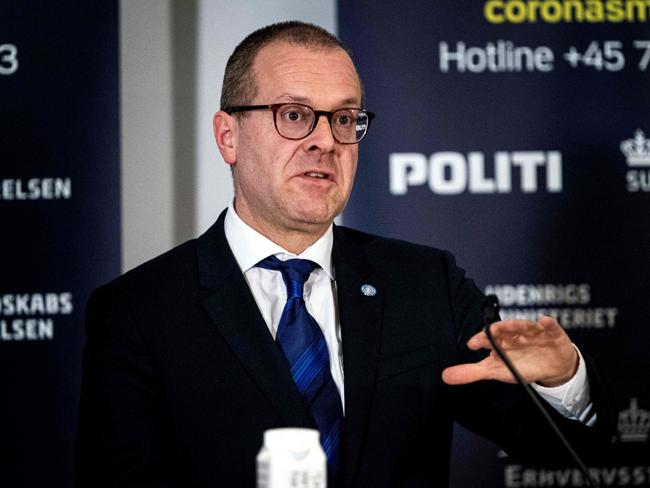
The WHO regional office for Africa also said last week that cases of Covid had plummeted in that region and deaths were declining for the first time since the Omicron-dominated fourth wave of the virus reached its peak.
The Omicron variant, which studies have shown is more contagious than Delta but generally leads to less severe infection among vaccinated people, has raised long-awaited hopes that Covid-19 is starting to shift from a pandemic to a more manageable endemic illness like seasonal flu.
But Kluge cautioned that it was still too early to consider Covid-19 endemic.
“There is a lot of talk about endemic but endemic means … that it is possible to predict what’s going to happen. This virus has surprised (us) more than once so we have to be very careful,” Kluge said.
With Omicron spreading so widely, other variants could still emerge, he warned.
The European Commissioner for Internal Markets, Thierry Breton, whose brief includes vaccine production, said Sunday that it will be possible to adapt existing vaccines to any new variants that may emerge.
“We will be able to better resist, including to new variants”, he told French television LCI.
“We will be ready to adapt the vaccines, especially the mRNA ones, if necessary to adapt them to more virulent variants”.
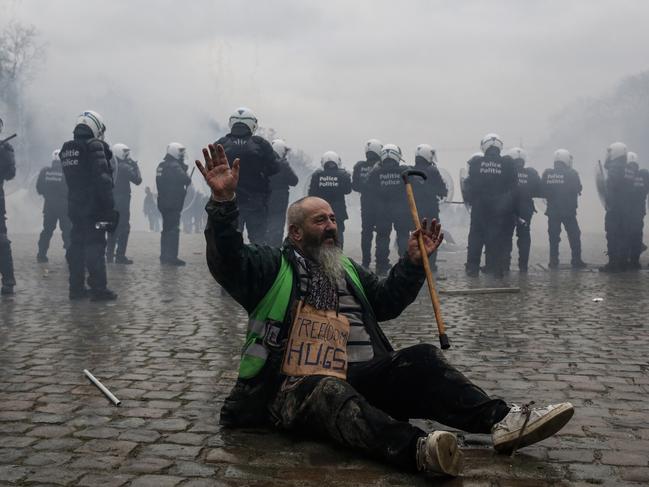
In the WHO Europe region, which comprises 53 countries including several in Central Asia, Omicron represented 15 per cent of new cases as of January 18, compared to 6.3 per cent a week earlier, the health body said.
Omicron is now the dominant variant in the European Union and the European Economic Area (EEA, or Norway, Iceland and Liechtenstein), the EU health agency ECDC said last week.
Because of the very fast spread of the variant across Europe, Kluge said emphasis ought to be on “minimising disruption of hospitals, schools and the economy, and putting huge efforts on protecting the vulnerable”, rather than measures to stop transmission.
He meanwhile urged people to exercise personal responsibility.
“If you don’t feel well, stay home, take a self test. If you’re positive, isolate”, he said.
Kluge said the priority was to stabilise the situation in Europe, where vaccination levels range across countries from 25 to 95 per cent of the population, leading to varying degrees of strain on hospitals and healthcare system.
“Stabilising means that the health system is no longer overwhelmed due to Covid-19 and can continue with the essential health services, which have unfortunately been really disrupted for cancer, cardiovascular disease, and routine immunisation”.
Asked whether fourth doses would be necessary to bring an end to the pandemic, Kluge was cautious, saying only that “we know that that immunity jumps up after each shot of the vaccine”.
BEIJING TESTS MILLIONS AHEAD OF OLYMPICS
Beijing city officials on Sunday said all two million residents of a neighbourhood where a small cluster of coronavirus cases was detected will be tested, less than two weeks before the start of the Winter Olympics.
China’s cases constitute a tiny fraction of the massive surge in countries around the globe, with the highly contagious Omicron variant driving a fresh spike in infections.
Still, multiple small outbreaks around China — including in Beijing — have tested its strict “zero Covid” policy, which authorities have pursued even as the rest of the world has gradually reopened.
Local authorities have identified Fengtai district in southern Beijing as the epicentre of a cluster, with the number of cases in the capital totalling 43.
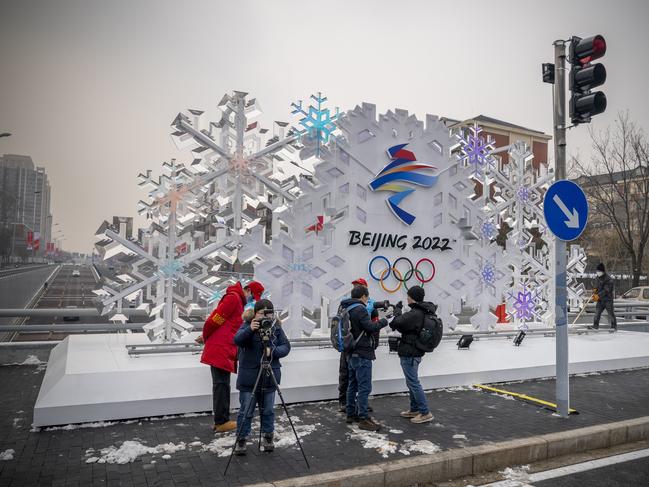
All two million of the area’s residents will be tested for the virus, officials said, and people from high-risk areas are banned from leaving the city.
“We must make every effort to stop the spread as quickly as possible by taking firm, strict and decisive measures,” Xu Hejian, spokesman for the Beijing municipal government, said at a briefing.
Fengtai is about 20 kilometres from the Winter Olympics freestyle skiing and snowboarding venue.
With the Beijing Games starting on February 4, international delegates, media personnel, and some athletes have already begun arriving.
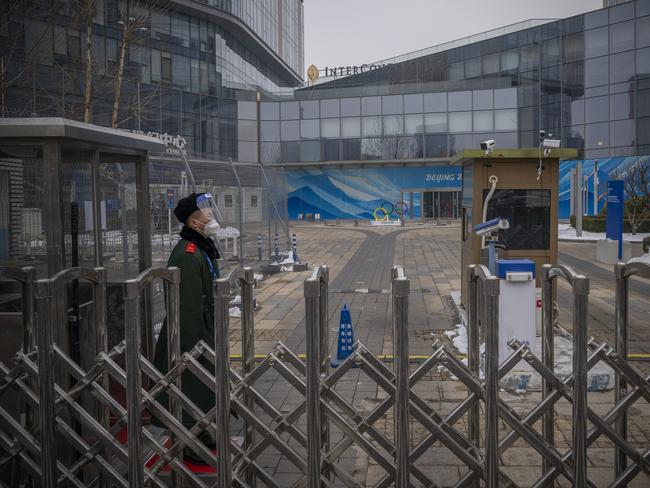
In an effort to thwart the coronavirus, China is sealing the Olympics inside a tightly controlled bubble cocooning thousands of people and stretching nearly 200 kilometres.
Olympic organisers said Sunday that 72 people who have arrived inside the bubble since it opened earlier this month have tested positive.
Thirty-nine tested positive on arrival at the airport and 33 within the closed loop. Those who test positive must isolate in their rooms until they return a negative test.
China’s postal service has ordered workers to disinfect international deliveries after authorities claimed mail could be the source of recent coronavirus cases.
Both the World Health Organisation and the US Centres for Disease Control have said the risk of being infected from contaminated surfaces is low.
LONDON PROTESTERS THROW NHS UNIFORMS AT POLICE
Activists from the World Wide Rally For Freedom and NHS100K protests marched down Regent Street in London and threw NHS uniforms at police officers outside Downing Street despite the government abandoning Plan B restrictions next week.
Hundreds of protesters are also demanding a stop to Covid-19 vaccines for children even though the cases of Omicron in children are rising. Demonstrators are also demanding an end to vaccine mandates.
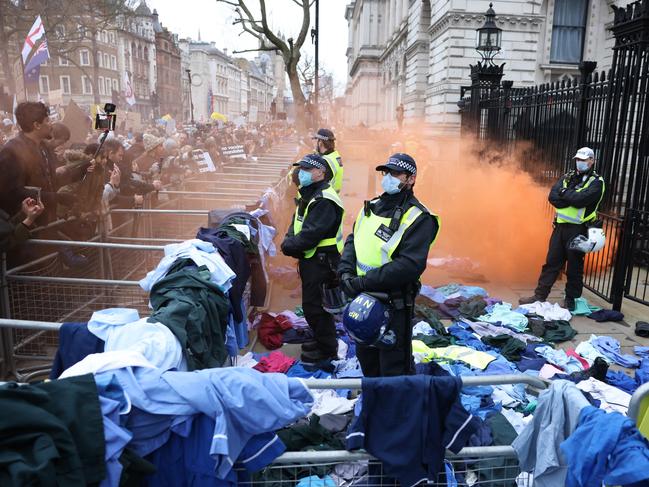
Police fired water cannon and tear gas on Sunday at stone-throwing protesters after tens of thousands of demonstrators marched through Brussels against Covid-19 rules.
Authorities estimated that around 50,000 people paraded through the Belgian capital — the largest in a spate of protests in the city over the past months.
Clashes broke out close to the headquarters of the European Union as police used water cannon and tear gas to push back protesters hurling paving stones and firecrackers.
News outlet RTL reported that masked demonstrators had smashed a glass entrance to the office of the EU’s foreign policy agency.
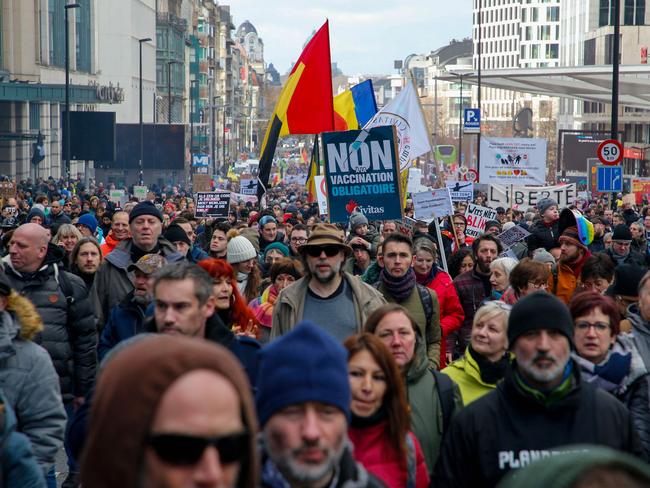
The protest comes as the Omicron wave causes infections to reach record highs across Europe.
Flags from Poland, the Netherlands, France and Romania could be seen in the crowd.
“What has been happening since 2020 has allowed people to wake up to corruption,” said Francesca Fanara, who had travelled from Lille in northern France, “I have come to march together.”
“It’s a health dictatorship,” said Adolfo Barbosa from Portugal. “It warms the heart to see these people here.”
Belgium has seen daily infections surge to over 60,000 in the past week in what authorities have called a “tsunami”.
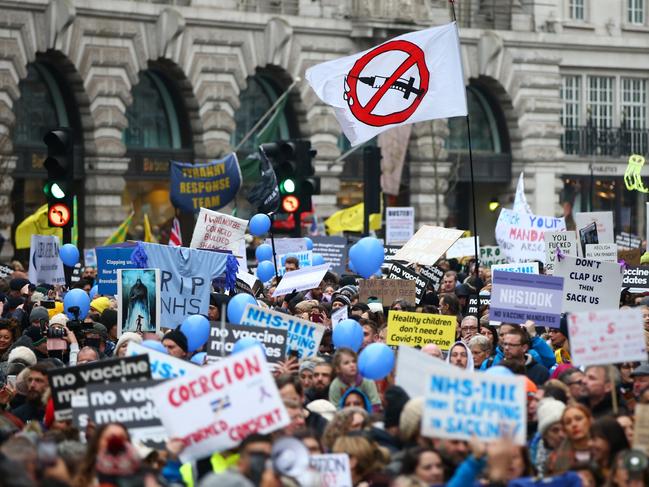
SAMOA GOES INTO LOCKDOWN AS 15 AUSSIES TEST POSITIVE
The Prime Minister of Samoa placed the Pacific nation into lockdown after 15 passengers on a flight from Brisbane tested positive for Covid-19.
The infected passengers were among 73 who arrived from Brisbane on Wednesday.
All the passengers were reportedly fully vaccinated and had tested negative for Covid before departure.
Prime Minister Fiame Noami Mata’afa said the government may cancel more flights from Australia.
A scheduled flight from New Zealand on Saturday, local time, was postponed.
Samoa, population 200,000 has reported 18 active cases.
NZ PM CALLS OFF WEDDING DUE TO OMICRON
New Zealand Prime Minister Jacinda Ardern has cancelled her wedding to her longtime partner as the country moves to the red traffic light setting due to rising Omicron cases.
Ms Ardern announced she and Clarke Gayford, the father of her daughter Neve, had called off their upcoming wedding in Gisborne, on the east coast of the North Island.
The event was set to take place at a lavish homestead at Nick’s Head Station, with Kiwi pop star Lorde said to be performing.
The cancellation came as Ms Ardern announced New Zealand will switch to the red light setting, which is imposed when the nation’s health care system is facing an unsustainable number of hospitalisations, from 11.59pm on Sunday.
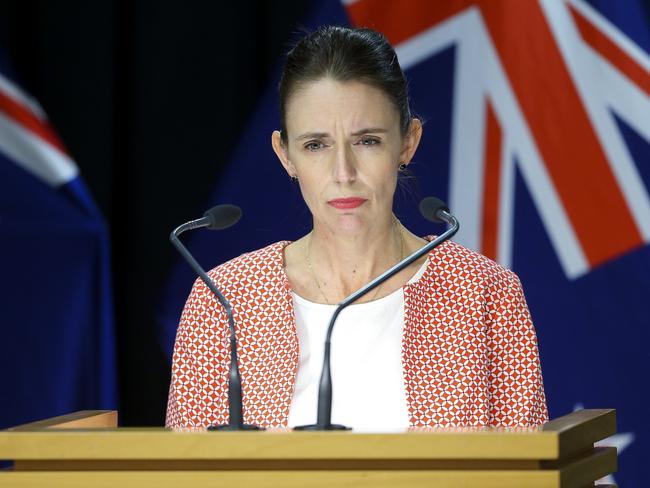
“When it comes to events, whether it’s a birthday or a wedding or any kind of event of that nature, gathering limits of 100 do come in with the red light setting at 11.59pm tonight,” Ms Ardern said.
“It will depend on the nature of the event and if they are using vaccine passes – if they are not, it reduces to 25 people.

“As for mine, my wedding won’t be going ahead but I just join many other New Zealanders who have had an experience like that as a result of the pandemic.
“And to anyone caught up in that scenario, I am so sorry, but we are all so resilient and I know we understand we are doing this for one another and it will help us carry on.”

Ms Ardern, when asked how she felt about the cancellation said: “Such is life. I am no different to, dare I say, to thousands of other New Zealanders.”
Nine Covid cases in Motueka, in the Nelson region on the South Island, are confirmed to have the Omicron variant, Ms Ardern said.
AUSTRALIA BRANDED COVID-19 DANGER ZONE
Australia has been identified as a “Covid danger zone” with the European Council placing extra restrictions on Australian travellers regardless of their vaccination status.
Australia has been singled out as a hot spot and an official directive has meant travel to European Union states, which implement their own responses, may be banned, or heavily restricted, The Australian reports.
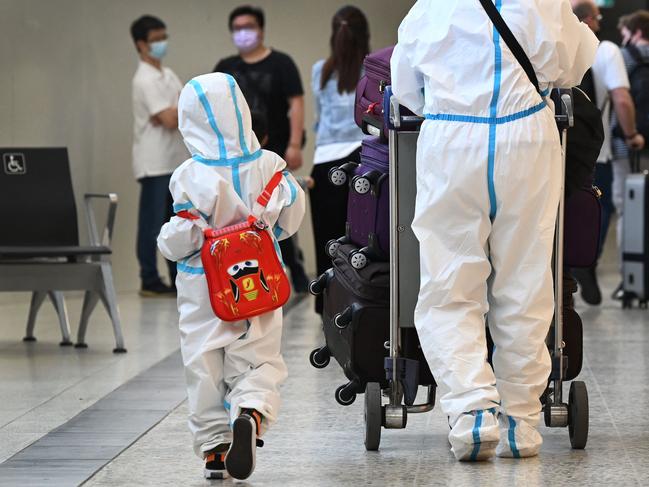
The US Centres for Disease Control and Prevention has also issued a warning to “avoid travel to Australia”, listing the country as “Level 4: Very High Level of Covid-19”.
The European Council has approved travellers from outside the Schengen zone, the 26 European countries that have officially abolished all passport control at their mutual borders.
Countries now on the EU “white list” include New Zealand, Colombia, Indonesia, Rwanda, Bahrain, Chile, Colombia, Indonesia, Kuwait, Peru, Qatar, Saudi Arabia, South Korea, United Arab Emirates, Uruguay and China.
Australians, however, have been specifically excluded from the easing of travel restrictions.
It said: “The Council updated the list of countries, special administrative regions, and other entities and territorial authorities for which travel restrictions should be lifted. In particular Argentina, Australia and Canada were removed from the list (to lift travel restrictions)”.
The EU also issued a statement, saying: “Australia was removed from the list of countries for which EU travel restrictions should be lifted. New testing and self-isolation requirements may apply depending on which EU member state you’re travelling to, regardless of whether you’re considered fully vaccinated or not.”
NEW SUB-STRAIN OF OMICRON INVESTIGATED
Scientists are investigating a new sub-strain of the Omicron variant that may be more transmissible than the current strain.
BA. 2, nicknamed “Omicron’s little brother”, made its first appearance in France a few weeks ago.
Studies are underway to find out the precise characteristics of the latest Covid-19 variant, which has been detected in countries including the UK, Singapore, Denmark, India and Sweden, according France 24.
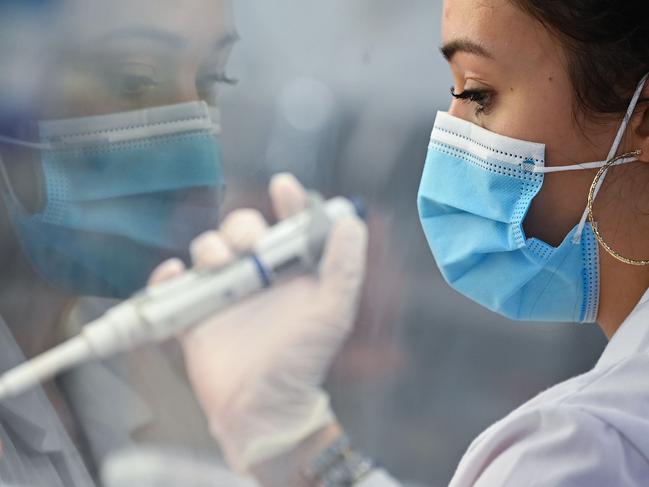
BA. 2 shares similarities with BA. 1, and they are both considered to be Omicron.
Cases in the UK are low, with just 53 sequences of the sub-lineage identified as of January 10.
The Health Security Agency has designated BA. 2 as a variant under investigation.
“It is the nature of viruses to evolve and mutate, so it’s to be expected that we will continue to see new variants emerge,” said Dr Meera Chand, incident director at the UKHSA.
It is not known whether BA. 2 causes more severe disease than the original Omicron variant.
However, initial studies from Denmark show no difference in hospitalisations between the original form and BA. 2, France 24 reports.
UKHSA said that 40 countries had reported BA. 2 sequences, with the most samples reported in Denmark.
Anders Fomsgaard, researcher at Statens Serum Institut told broadcaster TV 2 there was a possibility that people infected with BA. 1 might not be immune from then catching BA. 2 soon after.
“It is a possibility,” he said.
“In that case, we must be prepared for it. And then, in fact, we might see two peaks of this epidemic.”
Virologist Tom Peacock of Imperial College London tweeted that “very early observations from India and Denmark suggest there is no dramatic difference in severity compared to BA.1. This data should become more solid (one way or another) in the coming weeks.”




